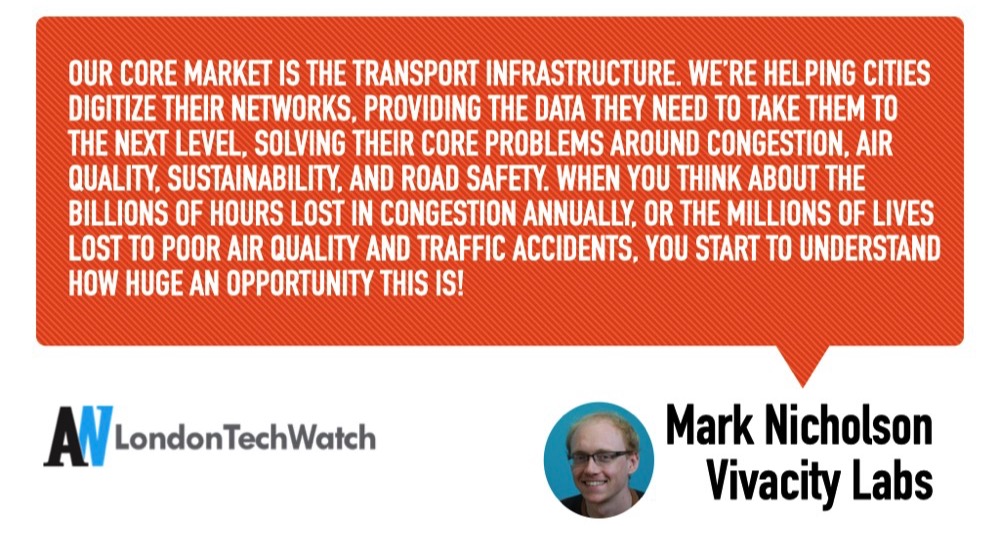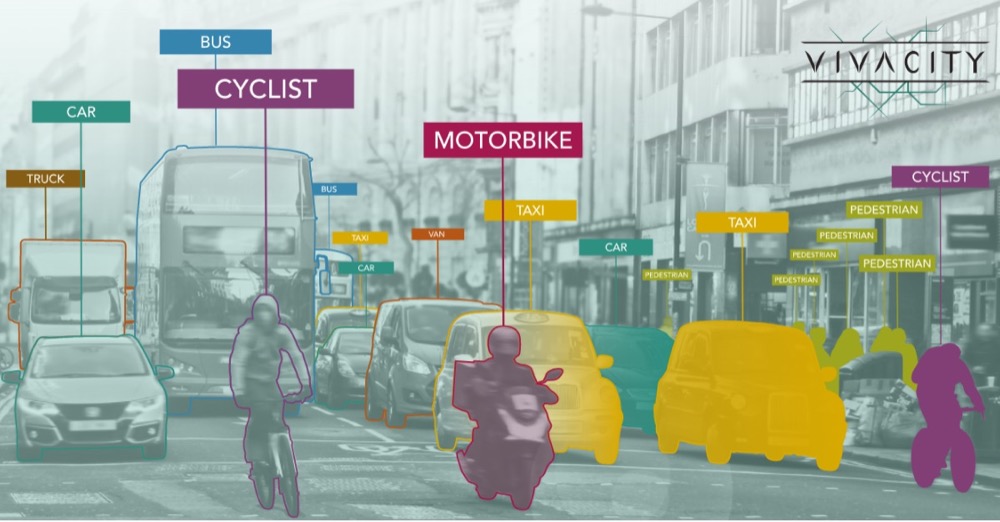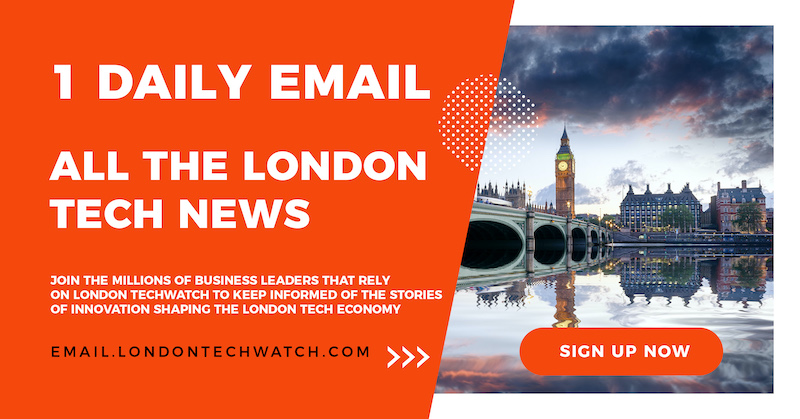Intelligent transportation systems that use embedded technology in infrastructure and in connected vehicles are the future and will improve safety and mobility. In urban areas where there is limited land available for road expansion, managing traffic through technology is the only viable solution as interest for living in cities continues to soar. Vivacity Labs has built an AI-powered traffic signal system and network technology that reduces congestion, decreases pollution, increases vehicular, pedestrian, and cyclist safety, and provides municipalities with actionable data for urban planning. The company’s sensors and platform are designed with privacy in mind as all data is anonymized and cannot be used for nefarious purposes. The company’s technology is already implemented in several locations in the UK with pilots and live installations with immediate plans to expand into other markets in Europe.
London TechWatch caught up with CEO Mark Nicholson to learn more about how the company’s use of technology reimages our relationship with traffic as a society, the experience of building a startup whose customers are governments, the company’s future plans, and latest funding round, which brings the company’s total funding to £6.7M.
Who were your investors and how much did you raise?
We raised £5M of Series A funding in a VC round led by investor Mobeus, with additional funding from existing investors Downing Ventures and London Co-Investment Fund.
Tell us about your product or service.
At Vivacity, we work with government, regional bodies, and local councils to help revolutionise the way our cities and transport systems are managed, operated, and used. Our AI sensors and ‘Smart Junctions’ signal control gather detailed and anonymous data 24/7 on transport modes, traffic flow and travel patterns, supporting strategic decisions to help optimise the transport network and improve urban infrastructure.
 What inspired the start of Vivacity Labs?
What inspired the start of Vivacity Labs?
The company was really founded around a team, rather than an idea. Having worked together before on a solar-powered car, the founders knew we could push out the cutting edge of technology together. That project gave us the entrepreneurial itch, and while working in a variety of traditional graduate roles we were imagining a different future behind the scenes – one where the infrastructure and vehicles worked together in a future autonomous world. Once those ideas reached critical mass, we decided to take the plunge!
How is it different?
Vivacity Labs’ USP is that we give the city the equivalent of a network of humans standing at key points across the network. Anything a human can understand – whether that’s behaviours, types of vehicle, interaction patterns, etc – we can understand too. No longer does the city have to extrapolate from one-day manual counts, or basic induction loop data – a detailed understanding of the city now at their fingertips.
We’re using this depth of information to build intelligent traffic lights with AI too, allowing cities to prioritise cyclists & optimize for air quality; creating the future that journalists of 10 years ago were predicting AI could bring.
What market you are targeting and how big is it?
Our core market is the transport infrastructure. We’re helping cities digitize their networks, providing the data they need to take them to the next level, solving their core problems around congestion, air quality, sustainability, and road safety. When you think about the billions of hours lost in congestion annually, or the millions of lives lost to poor air quality and traffic accidents, you start to understand how huge an opportunity this is!
What’s your business model?
As an AI tech business, data privacy is at the heart of our model. From day one, we set out with a European, citizen-centric vision of the Smart City. We believe that all personal data should be protected, and our sensors have been developed using privacy-by-design principles to ensure that personal data is never compromised.
To enable this privacy-centric model, we are funded by city authorities, helping to streamline their operations and make their large investments into road infrastructure more efficient.
How has COVID-19 impacted your business?
Like all businesses, it of course had an impact. Less than a year into our new office home, we were not only back to working from home, but we were also having to manage a business of – at the time – over 40 people, in separate locations, and with different projects happening across the country.
But it also showed the incredible ability of our employees to adapt to the circumstances. Adjusting to these new conditions, we worked with organisations using our technology to help travel during lockdown, including assessing and facilitating the significant increase in Active Travel. By July 2020, we had doubled our client base during lockdown.
What was the funding process like?
This was the smoothest funding process we have ever been through – we have learnt some lessons along the way! It took just under 5 months from hitting “go” on speaking to investors to having money in the bank account, although we were preparing for a few months ahead of that.
The round came with the obligatory set of investors saying no, but fortunately also had a number of investors saying yes, allowing us to choose the investors who were the best fit for the business. We’re really excited to be working with Mobeus as a result of this round!
What are the biggest challenges that you faced while raising capital?
GovTech is still a relatively new field, at least from a startup perspective. We’re not just another B2B SaaS company – our business model, sales process, and client base looks very different to most startups. It took quite a while for investors to understand that, and for many investors that was too large a stumbling block; they tried to apply standard SaaS metrics to us, where we look astronomically good on some & terrible on others, because those metrics aren’t really a good definition of our business.
GovTech is still a relatively new field, at least from a startup perspective. We’re not just another B2B SaaS company – our business model, sales process, and client base looks very different to most startups. It took quite a while for investors to understand that, and for many investors that was too large a stumbling block; they tried to apply standard SaaS metrics to us, where we look astronomically good on some & terrible on others, because those metrics aren’t really a good definition of our business.
What factors about your business led your investors to write the check?
For our investors, our continued strong focus on a specific, narrow market, and the growth trajectory that helped to create, were critical parts of the investment thesis. We have demonstrated our unit economics conclusively, and have great visibility into future growth due to the length of the public sector sales cycle.
This gave us a really solid baseline to present, and to pass the financial sniff test with flying colours – at which point there was huge confidence in our future strategy and ambitions, because they were built on great successes & financial stability.
What are the milestones you plan to achieve in the next six months?
We’re planning to double our company headcount, and we are recruiting for roles across the company, including in R&D/software development, sales and marketing, and operations.
As I’ve already touched on, we’re seeing demand from international markets for smarter transport insights too. So, in the next 6 months, we’ll be adjusting our focus to support customers in countries including the Nordics, Benelux, and Australia.
What advice can you offer companies in London that do not have a fresh injection of capital in the bank?
In my eyes, the only way to start, or continue, a new venture is to focus on one single, narrow problem, and solve that better than anyone else. The chances of that problem being identical in many countries is very slim – there are always local adaptations that are needed. So, my advice would be focus, focus, focus, and don’t let this time of international opportunity created by COVID & global home working distract you from what you need to do to win in your core, original market. Only once you have cracked that at scale, and have the capital to delegate management of that ongoing UK piece to a talented, trusted team, should you start to explore international.
Where do you see the company going now over the near term?
Our primary goal right now is helping society and travel to reshape and restart again after another lockdown. Through providing anonymous data on the impact of road changes and travel behaviours, we can help authorities better manage high footfall areas, public transport, and active travel. This will be crucial in ensuring safety as restrictions start to ease.
The smarter our cities become, the more interconnected, sustainable, and safer our journeys will be, and the easier it will be for us to return to a new normal.
What is your favourite restaurant in London?
So many great restaurants to choose from! However, if I had to call out one, I’d say Dotori in Finsbury Park. The service can be terrible, but given you need to turn up at 6pm to get a table, as otherwise the waiting list can run to hours, I think that says something about the food!






